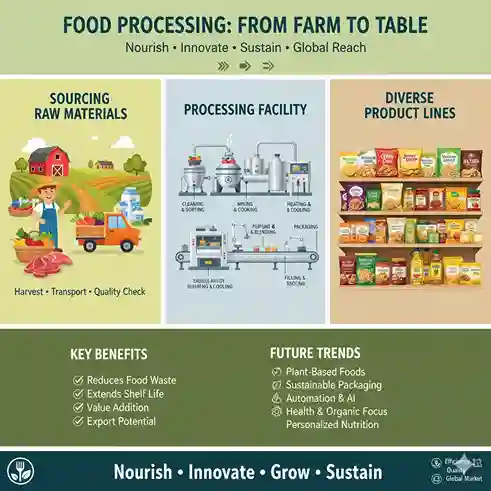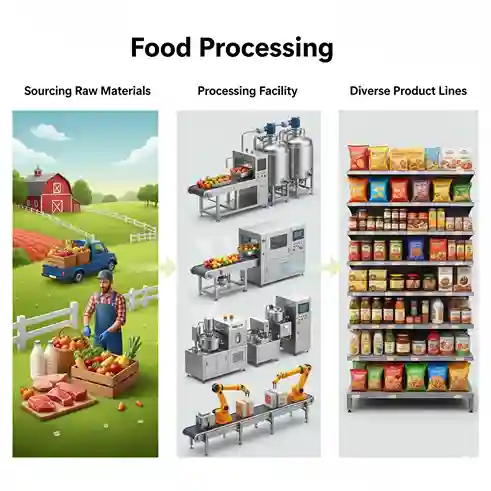Food processing is totally trending right now. You really can’t step out of the house without seeing their advertisements everywhere. Brands keep coming out, innovating ways on how you can turn these simple veggies and grains into cool snacks or even quick dinners.
The idea is that simple: take the good stuff from the farm, make it taste good, make it easy to eat, and bam! Dinnertime is just a microwave away. This keeps food from being spoiled quickly and prevents wastefulness. Even the boring potatoes now get a glow-up and become way more valuable.Groceries
So are you thinking to enter this market? That is a smart move. Fast and healthy foods are what people demand nowadays. The demand is just increasing all the time. Start a food processing business, and you can make good money. Also, it is meaningful.
Next, I’ll talk about all these benefits. I will highlight a few bumps on the road. I will talk about how you start and where the industry is moving in this regard. So let’s get started.
Read Our Project Report: Click Here
What Exactly is Food Processing?
This includes activities, such as cleaning and packaging apples, which are very simple to very complex operations, such as freezing, canning, fermenting, and then cheese-making plants, juice making, bread making, or chips making plants. In fact, it’s not glamorous but someone has to do it for our snacks.
Food Processing: Its Importance
Through food processing, food is preserved, shelf life extended and seasonal foods made available all year round. Making food more easy to store and transport, canned products have wider distribution, allowing more and more people-living in remote areas or urban areas-to access these products. Food processing gives rises to a broader market, creates jobs, and improves the agriculture sector. It adds value to farm products, thereby contributing to the country’s economic growth.
Types of food processing business
Lots of the types of food processing businesses are entrepreneurs present. And there are great numbers of trending food processing businesses.
- Dairy Processing: Milk, yogurt, cheese products and butter are produced from dairy processing.
- Fruits and vegetables Processing: Courses offered are study programs on juice production, pickling and frozen vegetables.
- Grain Processing: Includes flour, breakfast cereals and noodles.
- Meat and poultry Processing: Products that are ready for cooking like sausages and canned meat are produced.
- Snacks and Confectionery Units: They produce chocolates, chips, biscuits and candy.
- Packaged and Frozen Foods: Includes bakery products, frozen meals and curries.
- Spice Extraction Units: This is a specific unit packaging spices and edible oils.
This diversity allows entrepreneurs to choose a niche based on their investment capability, skills, and local demand.
Read More: How to Start Food Processing Business
How To Start A Food Processing Business
Market research
Conduct detailed market research covering customer preference, demand of certain food product, and competition in your locality. You can then make a decision as to what best to offer your target market.Groceries
Choose Your Product Line
Select a niche product that fits your budget and skill set. For example, dairy processing units can be a good choice for you if you happen to have a local farm that has dairy products.
Develop an adequate Business Plan
Create a complete business plan concerning the investment, machinery, and raw materials. Also, include staff, production capacity, marketing strategies, and costs to recruit personnel.
Licenses and Legal Requirements
The food processing industry is mandated to comply with stringent safety and quality regulations. For example, in India you will require FSSAI licence, GST registration and local permit.Groceries.
Install production unit
Select a site with raw material accessibility and transportation facilities before investing in machinery to meet production capacity.
Source Raw Materials
Valuable connections should be made with wholesalers or suppliers to ensure that high-quality, fresh raw materials are available.
Hire and Train Staff
Employ skilled personnel to operate machines, monitor quality, and handle packaging. Periodically conduct training of the employees on safety and hygiene standards.
Branding and marketing
Beautiful packaging will help you establish a strong market presence. To extend your reach, use social networking websites, ecommerce platforms and partnerships with supermarkets.

Food Processing Business: Advantage
- High Demand: Packaged food products face a high demand due to the busy lifestyles of people and their convenience.
- Job Creation: It generates employment from the farm to distribution.
- Value Added: An added value of processing to raw agricultural commodities increases their market value.
- High potentials for export: Food processors can export their products on international markets and gain foreign currencies into the coffers.
- Government Support: Several governments have been giving financial, indirect, and training support in establishing start-ups in food processing.
Read More: List of 33 Profitable Food Manufacturing Business Plans
Food Processing Industry Challenges
This business is not without its challenges, despite its potential.
- High initial investment: Machines and setup costs are expensive.
- Strict Regulations Maintaining food safety standards and quality standards is important but time-consuming.
- Transportation and Storage: Cold storage and efficient logistics are essential to keeping perishable products fresh.
- Competition The competition in the market is fierce, and certain brands dominate certain sectors.
- Supply chain issues: Seasonal availability can affect production.
Entrepreneurs can address these challenges through investing in technology, establishing strong supplier relationships and focusing their efforts on niche markets.
Food Processing Industry Trends
- Organic and Healthy Products: Today’s consumers prefer low-calorie, chemical-free organic foods.
- Ready to Eat Meals: As urban lifestyles become more hectic, frozen and ready-to eat foods are becoming increasingly popular.
- Plant Based Foods: With the rise of vegan diets, plant-based proteins have become more popular.
- Sustainable packaging: Eco friendly and biodegradable packing solutions are essential.
- Smart Technology and Automation: AI, IoT and automation are used to improve the efficiency and quality control of food processing units.
Read Our Book: Click Here
Investment Required for Food Processing Business
The size of your business will determine the amount you invest.
- Small Scale Units: Need Rs 2-5 lakh for raw materials and basic machinery.
- Medium Scale Units: Need between Rs 10-50 lakh for storage and advanced equipment.
- Large-Scale units: Investments may exceed Rs1 crore in export-oriented businesses.
Subventions and loans are often provided by governments to entrepreneurs in order to ease their financial burden.
How to market your food processing business
The key to success is marketing. To begin with, Create a strong identity for your brand with an attractive name and unique packaging. Next,Promote your products on social media sites like Instagram, Facebook and YouTube. In addition, Partner with online marketplaces, local supermarkets and grocery stores. Free samples, referral programs, and discounts are great ways to attract new clients.
Opportunities in Food Processing
Food processing offers many opportunities, thanks to the increasing urbanization, the changing eating habits and government initiatives. Entrepreneurs may explore exports and organic foods. Next, They can also look into packaged snacks and nutritional supplements. In rural areas, setting up a food-processing unit can provide direct benefits for farmers and have a positive impact on the economy.
Find the Best Idea for Yourself With our Startup Selector Tool
Conclusion
Food processing is one of most promising industries to start a business in. The food processing industry adds value to agriculture products, creates employment, and helps meet the demand for nutritious and convenient foods. Next we must say, Despite the challenges, innovative marketing, quality control and strategic planning can help ensure long-term growth. This sector offers a lot of opportunities for startups. Ultimately, thanks to the government’s support and the global market.
Food Processing Business: FAQS
Q1. Food processing is a profitable business?
Food processing is a profitable business because of the increasing demand for packaged foods and ready-to -eat food. Entrepreneurs can get high returns with good branding and quality control.
Q2. What licenses are required to operate a food-processing business?
In India, for example, food businesses are required to have food safety certifications. GST registration, local trade licences, and environmental clearances are also required depending on product type.
Q3. What is the cost of starting a food processing company?
Small businesses can begin with a small investment, ranging from Rs 2-5 lakhs. Medium-sized ventures will need between Rs 10-50 lakhs. For large-scale businesses, particularly those that focus on exports and are geared towards growth, an investment of more than Rs1 crore may be required.
Q4. What are some ideas for low-cost food manufacturing business?
Pickles, spice powders, and fruit juices are all low-cost options. In addition, they require minimal machinery, making them ideal for beginners. Furthermore, these products can easily be prepared at home or in small facilities, allowing entrepreneurs to start with limited resources.
Q5. What is the future for the food processing industry in the United States?
With the increased demand for healthy and organic products, the future looks bright. Moreover, the industry will be shaped by sustainable packaging and automation. Therefore, entrepreneurs who adapt to these emerging trends will be able to grow quickly and stay ahead of the competition.








